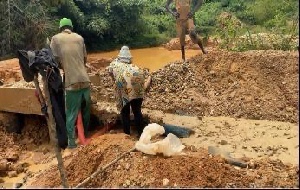- Home - News
- Elections 2024
- News Archive
- Crime & Punishment
- Politics
- Regional
- Editorial
- Health
- Ghanaians Abroad
- Tabloid
- Africa
- Religion
- Photo Archives
- Press Release
General News of Thursday, 27 March 2025
Source: www.ghanawebbers.com
Space science under siege: Encroachment threatens research as scientists battle mining devastation
Ghana’s space scientists are facing a crisis on the ground.
The Ghana Radio Astronomy Observatory is threatened by land encroachment. This situation endangers years of scientific progress.
Dr. Proven Adzri Emmanuel manages the observatory. He states, “The initial land was 165 acres. It came to 75. Now we have less than 30.” He adds that the facility is worth over $12-15 million.
The Ghana Radio Astronomy Observatory (GRAO) is unique in sub-Saharan Africa, except for South Africa. It features a 32-meter radio telescope, a 16-meter telescope, and a 9-meter telescope. Scientists converted an old telecom instrument into a functioning Very Long Baseline Interferometry (VLBI) radio telescope.
This observatory is part of the Square Kilometre Array (SKA) project across Africa, which is now at risk.
Land encroachment disrupts critical radio signals used for research. Dr. Proven warns that nearby activities produce radio frequency interference (RFI). This background noise affects their data collection.
He explains that interference comes from various devices like mobile phones and microwaves nearby. “In terms of interference, we are doing very badly,” he says.
Dr. Theophilus Ansah Narh, Deputy Director of the Ghana Space Science and Technology Institute, emphasizes that interference threatens their work. He states, “This is our project site... heavy encroachment affects our science.”
However, this issue is just one challenge for Ghana’s space science community.
Tracking Ghana’s Vanishing Forests
Despite these challenges, scientists are focusing on another crisis: disappearing forests and polluted rivers in Ghana. For years, measuring destruction from mining has been difficult.
In 2023, space scientists used satellite technology to quantify this damage. They found that mining causes the loss of about 23 football fields of forest cover daily.
Dr. Joseph Bremang Tandoh leads the Ghana Space Science and Technology Institute. He reveals that between 2007 and 2023, almost 55,000 hectares were lost using satellite images to track changes over time.
By the following year, conditions worsened significantly. Dr. Kofi Asare noted that over 59,000 hectares have been converted to mining—equivalent to about 84,000 football fields.
From 2015 to 2020, mining expansion increased by 72%. From 2020 to 2022, it surged by an alarming 135%.
The Western regions have been hit hardest with rapid deforestation and pollution in rivers once known for clean water.
Space Science to the Rescue
To address pollution issues, scientists developed methods to track water quality remotely using satellites.
Dr. Tandoh explains they monitor turbidity—how murky water appears—with satellite images instead of physical inspections along riverbanks.
This technology allows real-time monitoring of water quality changes across rivers in Ghana.
Additionally, space scientists use satellite technology for food security by estimating farm yields through crop and soil condition images.
Ghana’s Space Science at a Crossroads
Despite these advancements, Ghana's space program lags behind other African nations like Nigeria and South Africa which have multiple satellites in orbit; Ghana currently has none.
Dr. Tandoh insists on needing a satellite built by Ghanaians for Ghanaians: “Nigeria has about seven satellites; South Africa nearly thirteen.”
With increasing encroachment and environmental devastation alongside limited investment in space technology, Ghana's scientific future hangs in balance. The pressing question remains: will action be taken before it’s too late?











